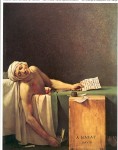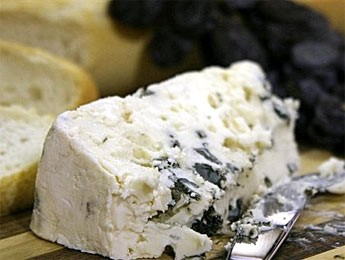 Just as President Bush was 'deeply mourning' the death of Andrew Wyeth, his administration was being derided for one of its last balmy acts. A 300% tariff is being imposed on one particular French cheese. Whilst the rest escape with a mere 100% penalty in retailation for French refusal to accept US hormone-treated beef, only Roquefort rejoices in the distinction of being placed firmly beyond the reach of American consumers. Whether or not US goat's cheese makers are celebrating their new found commercial advantage is hard to say, but French farmers are telling a very different story. Last time they were punished in this way they burnt down a Mcdonalds. But a reprieve may be imminent. In the hope that he will wake up and smell the fromage, President Elect Obama has been sent a sample of the blue-veined product.
Just as President Bush was 'deeply mourning' the death of Andrew Wyeth, his administration was being derided for one of its last balmy acts. A 300% tariff is being imposed on one particular French cheese. Whilst the rest escape with a mere 100% penalty in retailation for French refusal to accept US hormone-treated beef, only Roquefort rejoices in the distinction of being placed firmly beyond the reach of American consumers. Whether or not US goat's cheese makers are celebrating their new found commercial advantage is hard to say, but French farmers are telling a very different story. Last time they were punished in this way they burnt down a Mcdonalds. But a reprieve may be imminent. In the hope that he will wake up and smell the fromage, President Elect Obama has been sent a sample of the blue-veined product.
Speculation
-
Cheesed off by isolationism
-
All aboard for St Mary Mead?
 A random trawl through this Autumn's bumper crop of things 'researchers have found' reveals that:
A random trawl through this Autumn's bumper crop of things 'researchers have found' reveals that:- With a 20 to 30% annual rise in the price of onions, potatoes and carrots, people are responding to the call to 'grow their own'. Now you can't get an allotment for either love or a prize pumpkin.
- 'the humble turnip is the dish of the day' according to today's Sun, as people go back to their roots to save money.
- Because of rising fuel costs, more and more children are walking to school, where once they were driven.
- 15% of motorists report having cycled recently rather than taken the car.
- We are enjoying more and more cheap nights out at the 'flicks'.
- Bookings for traditional seaside holidays are in; flying to the costas is out.
- Pricey American coffee shop chains are being shunned in favour of a nice, traditional English afternoon tea.
The good news is that the Tories will prevent the construction of a new runway at the Heathrow aerodrome. They tell us they are drawing up plans to revitalise the railways.

What a fine return to 'old-fashioned values' this all seems to add up to. For me these are symbolised by St Mary Mead, the idyllic 1950s English village (perhaps Nether Wallop in Hampshire) in which Agatha Christie's heroine Miss Jane Marple lived. She was played to perfection by Joan Hickson.
We can trust the British press to tell us like it is, can't we? But is that blood on the carpet in the vicar's study? I can almost hear the insistent ring of a bicycle bell...
-
Making it live at the Proms
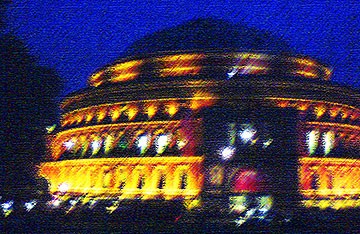
Which is better: a 'live' broadcast of a classical concert or being in the Royal Albert Hall for the performance itself? Last night's Prom included Beethoven's Fifth Symphony and centenarian Elliott Carter's Oboe Concerto. Using the BBC iPlayer I was able to compare the television broadcast, the radio version and the experience of actually being in the hall at the concert.
The TV broadcast includes a revealing interview with soloist Nicholas Daniel. In it he talks about the rapt concentration on the faces of the crowd of Promenaders standing in the arena. The Proms audience is particularly attentive - unsurprising since the hall is dominated by a well-informed crowd of 400 or more who are so motivated by the music that they are prepared to stand for it. But join any audience at a live performance and you plug in to the collective experience in a way that never happens at home.
Conductor David Robertson also gave an interview in which he identified Elliott Carter's ability to capture real experience in his music, in the same way as Virginia Woolf did in 'stream of consciousness' novels like Mrs Dalloway. Being in the Albert Hall it is the moment-by-moment collective experience that makes the music.
Standing in the hall with my £5 ticket bought just before, I was hot, and not quite close enough. But when the conductor's baton hovered momentarily at the top of its first down beat, hushed expectation distilled into one moment of complete focussed concentration.
In the fifth symphony the sound was rich with detail I'd never noticed in recordings, and the dynamic range was vastly greater than any recording. Even a static viewpoint sometimes distracts me and so I listen with my eyes closed. In the apparently familiar Beethoven there were moments of complete engagement in the music. This is consciousness changing 'flow experience'. When I was a child it happened so much more easily.
The broadcasts are flush with background information, sophisticated camerwork and the BBC's determinaton to make everything upbeat and accessible. The sound is perfectly balanced. The broadcast 'experience' is almost too polished and content packed, (how I love close-ups of the hammed-up histrionics of some conductors and soloists!). For me, make it live any day.
-
Getting a little list
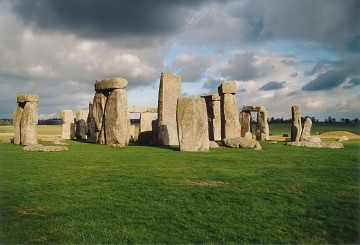
I do like lists. For the prevaricator, the making of them is a satisfying way of delaying the work itself. For the anorak (and we all secretly have an anorak within, don't we?) lists are all about neatness and order and collecting. Like butterflies pinned down under glass, lists fix the worryingly mutable world.
The UNESCO list of world heritage sites satisfies several of these instincts. Is the list complete? What are the selection criteria? Which have I been to? Where to next? In England, Bath; Blenheim; Stonehenge; Westminster; Durham and Canterbury all make their expected appearances. But not Oxford or the landscape gardens at Stowe or Lincoln or Wells Cathedrals or Windsor Castle? And what about the Lake District?
The most recent UK addition is the newly cleaned-up satanic mills of Cornwall and West Devon. Other 'post-industrial' tourist sites are Saltaire (worth a visit but is it a world heritage site to match the tower of London?) and Derwent Valley Mills where Richard Arwright worked and there are '680,000 bobbins on display'. That is a lot of bobbins. And should I mention Liverpool?

 In Sweden there are several longwave masts just waiting to be admired. And Bauhaus architecture in Tel Aviv, too. It's evident that some countries are better than others at agenda pushing.
In Sweden there are several longwave masts just waiting to be admired. And Bauhaus architecture in Tel Aviv, too. It's evident that some countries are better than others at agenda pushing.Reasons for smugness, and for poetry: Bruges, the Plantin-Moretus, Split, Dubrovnik, Trogir, Chartres, Mont St Michel, Amiens, Versailles, Pont du Gard, [the whole of?] Bordeaux, Paris, Cologne, the Vatican, Prague, Budapest, Vienna, Florence, Pompeii, San Gimignano, Vicenza, Sienna, the Amalfi, Naples, Verona, Tivoli, St Petersburg, Alhambra, Guadi, Ibiza, Drottningholm, Göreme, Istanbul, Troy, Pamukkale [no Ephesus?], And the Stautue of Liberty and the The Red Fort, Fatephur Sikri and the Taj Mahal. And some others I missed.
 But I was reassured to find plenty more for my own heritage site 'to do' list. Khajuraho, Aachen, the Acropolis, Mount Athos, Ravenna, Rietveld Schröder House, Butrint in Albania (been wondering about it for ages), Sintra, Valetta. Mérida, Salamanca, Route of Santiago de Compostela and a reassuring heap of places in former Soviet Republics including Riga, Český Krumlov and Tallin. And with less footprint, Hadrian's Wall and the Giant's Causeway.
But I was reassured to find plenty more for my own heritage site 'to do' list. Khajuraho, Aachen, the Acropolis, Mount Athos, Ravenna, Rietveld Schröder House, Butrint in Albania (been wondering about it for ages), Sintra, Valetta. Mérida, Salamanca, Route of Santiago de Compostela and a reassuring heap of places in former Soviet Republics including Riga, Český Krumlov and Tallin. And with less footprint, Hadrian's Wall and the Giant's Causeway.That's enough lists.
-
The elevation of St Boris of Henley

There's much chortling that around a quarter of London's electorate decided to make 'bumbler' Boris their Mayor on St Boris's Day. But how has the blonde bombshell served his Henley constituents and what will they do without him?
In the Bulgarian Orthodox church at least, the anniversary of the death in 907 of St Boris is remembered. He was notable for his serenity, aside from a lapse in which he blinded his son to stop him turning to paganism. 'Serene' is not the word to describe Boris Johnson MP in Henley-on-Thames. Scarcely an issue of the local paper has been complete without two or even three photos of Boris pressing the local flesh. Opening this or standing against the closing of that, Boris has been there, even during the Mayoral campaign.
He responded twice to our lobbying on local causes. Once a local hotelier 'laid on a crayfish lunch' to woo him to our presentation of the need for a new bridge across the Thames between Reading and Henley. He watched our video of the 45min queue of standing traffic snaking round narrow village lanes, ate the crayfish sandwiches, and pronounced (fresh from his trip to a local marina) that the best answer to the problem of 13,000 vehicle movements a day choking a tiny village was to set up a ferry to carry passengers across the river.
This entertaining tendency to make it up on the hoof (remember his disastrous gaffes in Liverpool and elsewhere) conceals Boris's steely determination. At the post-electoral celebrations his sister commented that Boris has always got what he wanted.
Each time we met him Boris was surrounded by a group of local party faithful. Once or twice I caught them raising their eyebrows - 'Boris will be Boris' was the story. First Hezza represented us (another MP notable for his beazer), then Boris. So who will be next? Perhaps his father Stanley, who confirmed:
"Put it this way, I'm still on the candidates' list. Obviously it would be up to the Henley association as to whether they invite me for interview, but I don't see why I shouldn't put in for it."
He certainly has the requisite distinctive hairstyle.
The the nu-Labour project is on its last legs and Londoners have registered their protest at Gordon Brown's lack of personality. It remains to be seen if (in spite of his goodwill and determination) Boris really will be enough to reduce the death rate of young black men in the capital.
-
The beast within?
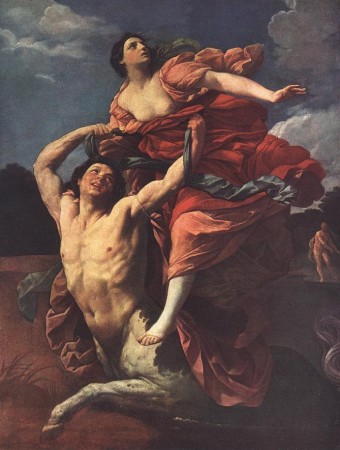
A report in Pravda (of all reliable sources) says that centaurs were real. Researchers decided this because of the number of cave paintings depicting the chimeric creatures. The article states, in a somewhat old-fashioned translation, that:
"Historical sources reveal that buggery was very popular among ancient Greeks and Romans. A legend says that Greek scholar Thales recommended his master Periandr not to engage unmarried shepherds nor to produce more centaurs."
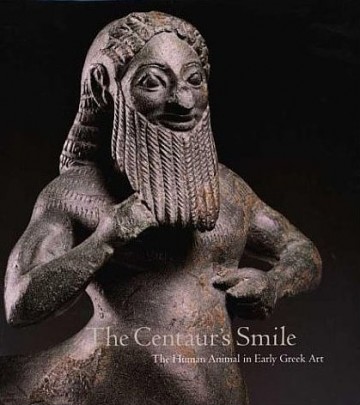
That interpretation may not convince, but there is no denying the creatures' pervasiveness. For 3,000 years or more the half-man, half-horse has been lodged in the collective consciousness, inspiring myth-making and art, standing both for animal passion and for the genial guardianship of knowledge.
The Centaur's Smile: The Human Animal in Early Greek Art is the catalogue of a 2004 Princeton exhibition which charted examples from as early as 750BC. In Pindar's poem, the kindly centaur Chiron 'smiles greenly' (as if with secret knowledge) at Apollo when he seeks advice on seduction techniques.
Guido Reni (whose 'Rape of Dejanira' is above) is one of countless gay artists since who have been fascinated by beastly half men.
Bruce Rogers' beautiful typeface Centaur was first used in 1915 for an edition of de Guérin’s prose poem Le Centaure. The font was later issued in a commercial version developed by Rogers and the Monotype Corporation. In de Guérin's sensuous story, the aged centaur Chiron describes his early days to a young mortal who seeks him out on a mountain top.
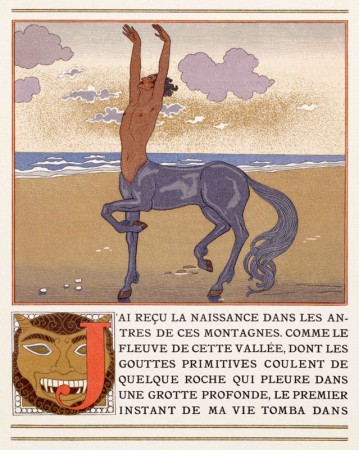 Other interesting editions of the de Guérin story include one printed by Ricketts and Shannon at the Vale Press in 1899 and this art deco interpretation featuring a distinctly un-menacing centaur by George Barbier (1928). Ricketts returned again and again to the centaur theme. In 1902 the artist and his long time collaborator Shannon were the models for a small painting of Nessus and his stolen bride Dejanira in which:
Other interesting editions of the de Guérin story include one printed by Ricketts and Shannon at the Vale Press in 1899 and this art deco interpretation featuring a distinctly un-menacing centaur by George Barbier (1928). Ricketts returned again and again to the centaur theme. In 1902 the artist and his long time collaborator Shannon were the models for a small painting of Nessus and his stolen bride Dejanira in which:"This bold defense of Nessus’ “rape” portrayed a willing Dejanira with strong shoulders, arms, and calves."*
Evidence that centaurs still hold a considerable homoerotic charge is provided by the recent phenomenon of 'boytaurs'. They are celebrated in a somewhat indecent website featuring 'Online resources for boytaurs, multilimbers, shapeshifters, and their friends'.
One lexicon defines a modern day centaur as "A gay man who lives openly in a predominantly heterosexual suburb."
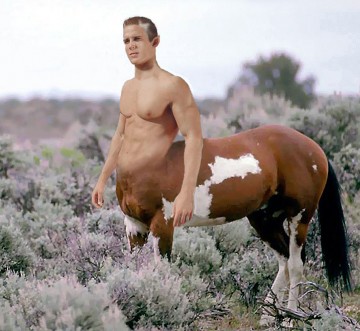
-
Going for a song
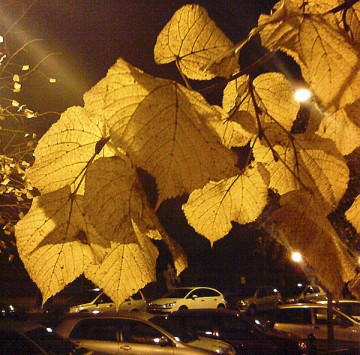
At this time of year the birdsong is a terrific pleasure, but not if you live in the city. The New Scientist reports the end of the dawn chorus, killed off by city noise. It was thought that light pollution was the cause, but now it seems to be simply that the birds can't make themselves heard over the din of the traffic. Late at night, on my way back from the station, I've often been stopped in my tracks by the sad sound of a solitary wren, singing its heart out under the sodium glare. Now researchers say birds are getting stressed out by this forced adaptation.
So it's a good thing that digital audio channel Oneword is no longer broadcasting. Thanks to the alternative reality provided by the internet, you too can listen to a sample of the channel's replacement, 16 hours a day of birdsong, apparently proving very popular with city-dwellers starved of the sound of the natural world.
-
Send in the droogs
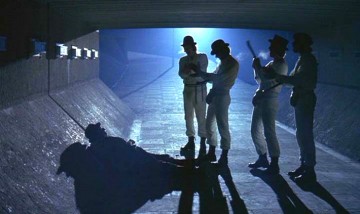 In Anthony Burgess's A clockwork orange the droogs are Alex's violent pals. Now we all get our kicks on the internet and look like meeting fewer and fewer people for real are we becoming a generation of un-socialised droogs, just as Gordon Brown is desperately trying to manufacture national allegiance?
In Anthony Burgess's A clockwork orange the droogs are Alex's violent pals. Now we all get our kicks on the internet and look like meeting fewer and fewer people for real are we becoming a generation of un-socialised droogs, just as Gordon Brown is desperately trying to manufacture national allegiance?A new report claims that British children are being 'raised online' spending at least 20 hours a week connected to the internet. In August 2007 Microsoft proudly put the figure at more like 34 hours. The IPPR report states that 57% of young people have come into contact with online porn. 117 videos featuring the term 'happy slap' were posted on YouTube last week, and 312 were posted as 'street fights'. Microsoft claim that internet use increases social interaction – but is this the kind they mean?
Just what does the availability on the internet of instant gratification of every kind do for tolerance? In the real world, gratification isn't instant. Things don't go to plan and people don't always behave predictably. How are today's kids learning to react?
Also this week, one third of teachers are reported as having been subjected to classroom violence, with 75% threatened by their pupils. Another report shows four times as many teachers finding knives on their pupils than in 2001, in spite of the increasing use of metal detectors in schools. Across the country, the quality of teaching is suffering as teachers struggle to cope with multilingual classes. In more than one in 20 schools, English is a minority language:
In the borough of Newham, nine out of 10 schools have a non-English first language majority. The same is true of a third of schools in Leicester and in Blackburn, and a quarter of schools in Birmingham.
Outside school, people are not mixing like they used to. Every community used to have a pub, church and post office at its centre. They were the hub of local life - places where we met new people and learned to get along. Now 2,500 more post offices are to close and in Langton Green in Kent:
Gone are three of the village's four pubs; gone are the two police houses; gone is the horticultural society; gone is one of the two grocery stores, one of the two butchers, the last dairy farm, the YMCA playing field, the doctor's surgery – all in recent memory – and now, gone is the post office. Gone too is the wildlife from the village pond, seen off by a new drainage system which draws in the oil and detritus from the road.
Publicans say that tradition and the fabric of society is being destroyed by the loss of four pubs per day across the country. Around one church per week is closed.
Another 2008 survey reports that 15% of people don't speak to any of their neighbours from one week to the next. And 65% said that in the future people will have more contact through the internet than in person:
"There's a real issue with people being dislocated from the communities where they live," said Ginny Lunn, the director of policy and development at the Prince's Trust. "Everybody needs to take responsibility for communities and make sure people aren't isolated, otherwise we could face a generation of people who will become unconnected from society."
Pundits say cash will solve the problem. The Government says things are improving. And L'Oreal says you're 'worth it'. At the grassroots, plenty of us are still trying, giving our time, building places like community orchards so that people can connect again. Margaret Thatcher's most memorable line was 'there's no such thing as society'. Don't let it come true.
-
Top of the art pops?
 Which are the world's 50 greatest works of art? The Telegraph has published Martin Gayford's list. It's necessarily a fabulously subjective exercise, running all the way from an Egyptian sculpture of 2800 BC via van Eyck, Michelangelo and Velázquez to a sculpture by Donald Judd from 1982.
Which are the world's 50 greatest works of art? The Telegraph has published Martin Gayford's list. It's necessarily a fabulously subjective exercise, running all the way from an Egyptian sculpture of 2800 BC via van Eyck, Michelangelo and Velázquez to a sculpture by Donald Judd from 1982. I was pleased to see the haunting Pompeii 'Villa of Mysteries' frescoes included, together with Giotto's breathtaking Scrovegni Chapel in Padua and Constable's 'Salisbury Cathedral from the Meadows'.
I was pleased to see the haunting Pompeii 'Villa of Mysteries' frescoes included, together with Giotto's breathtaking Scrovegni Chapel in Padua and Constable's 'Salisbury Cathedral from the Meadows'. But no Sistine chapel, or Turner 'Rain, Wind and Speed'! The Mona Lisa is knocked off her perch in favour of the same painter's 'Lady with an ermine' in Krakow. What about David's 'Death of Marat' with its superb handling of paint and poignant mythologising of the French Revolution? None of Ingres' portraits, with their relentless scrutiny of subject and no Delacroix or immaculate Vermeer interior? And what about the searing intensity of El Greco - and the homespun passion of Stanley Spencer?
And are the terracotta army and the Easter Island statues art works in the same way as the Jackson Pollock is thought to be? (I would have replaced it with something by Mark Rothko). Both the Easter Island statues and the terracotta army seem to me to be functional objects, created to fulfill a specific purpose, quite different to the making of an art work for its own sake.
I counted a respectable eight or so I've seen, but (with the help of some carbon offsetting), there's clearly plenty more prime art waiting to be discovered.
-
"Them brown people"
 ...Are all "bombers", according to a foolish seven year old in Holmfirth in Yorkshire. A woman of Pakistani origin, enjoying life with her mainly white neighbours, described hearing this said of her five year old by a stranger's child. It was soon after the July bombings in London. Can you blame her for moving from 'Last of the Summer Wine' country to urban Dewsbury?
...Are all "bombers", according to a foolish seven year old in Holmfirth in Yorkshire. A woman of Pakistani origin, enjoying life with her mainly white neighbours, described hearing this said of her five year old by a stranger's child. It was soon after the July bombings in London. Can you blame her for moving from 'Last of the Summer Wine' country to urban Dewsbury?Her voice is among many in an excellent series of programmes about Pakistan this week on Radio 4.
On Woman's Hour, an audience at Huddersfield University was in the main Pakistani. Most identified as British, but several wanted to know what had happened to 'British values'. Not just queuing and politeness, but tolerance and understanding.
Archbishop Rowan Williams has not seen much of that, after delivering a closely argued and liberal-minded talk on Islam and the British legal system. It was scheduled to be given in the ancient church of the crusading Knights Templar.
Williams begins by recognising a reallity - that sharia courts are operating in the UK now - and aligns Islam with other faiths such as Judaism that make rules for their followers that go beyond state law. Crucially he doesn't address the practicalities. What happens when religious law is in direct conflict with state law, as it would be if British sharia courts ever promoted the kind of sharia seen in Saudi Arabia? He blithely assumes people will be able to walk away from religious courts if they don't like them.
Bearded Asian men and wearers of the veil talked on Radio 4 about being stigmatised as religious extremists and potential terrorists. "Not everyone who wears a head-scarf is a potential Al-Qaeda member!" Young British Muslim women of Pakistani origin described how they walk a dizzying tightrope of mixed identities.
In spite of the support of the Bishop of Oxford, a mosque in Oxford is this week reviewing a non-Muslim's proposal to play the call to prayer to a community that is not predominantly Muslim. The mosque's shortwave radio call to prayer is currently used by just 100 people. Many furious local objectors resent any form of religion proselytising to them.
The Royal United Services Institute condemn Britain's 'misplaced' policies on immigration and multiculturalism, creating opportunities for terrorists: "The UK presents itself as a target, as a fragmenting, post-Christian society". Sir Trevor Phillips, Head of the Commission for Racial Equality has been warning for years of the dangers of segregated communities. Nobel Laureate Amartya Sen defends liberty as more important than multiculturalism "the demands of cultural freedom include... resisting the automatic endorsement of past traditions"
 Liberty's torch burns less brightly these days in the land of the free. The 'crusading' George W Bush this week used the July bombings as a justification for 'water-boarding' torture. Identity cards and incarceration without trial spark the fear that something similar is happening here.
Liberty's torch burns less brightly these days in the land of the free. The 'crusading' George W Bush this week used the July bombings as a justification for 'water-boarding' torture. Identity cards and incarceration without trial spark the fear that something similar is happening here.The racist five year old in Holmfirth spoke from ignorance, because he had never met his Asian neighbours. In Huddersfield, Pakistani people complained that catchment area rules were preventing them from integrating their children with the children of non-Asians.
Freedom, religion and difference are hot topics - and for good reason. If ever there was a good time for British people of every race and religion to get together to decide what really matters to us - and what kind of society we want for the future - it is now.
-
Will a crash take the rise out of the shard?
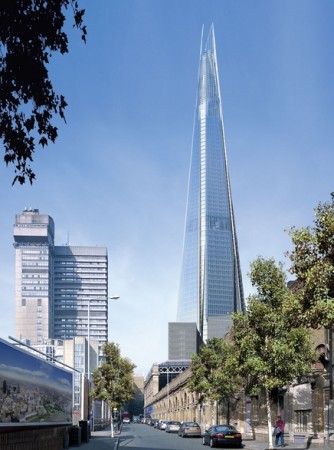 Given John Prescott MP's unlikely reputation as a lothario, it seems right that he be remembered for giving permision for London's most thrusting new erection - Renzo Piano's 'shard of glass' at London Bridge. Piano describes it as "a vertical town for about 7,000 people" based on "London's heritage of masts and towers".
Given John Prescott MP's unlikely reputation as a lothario, it seems right that he be remembered for giving permision for London's most thrusting new erection - Renzo Piano's 'shard of glass' at London Bridge. Piano describes it as "a vertical town for about 7,000 people" based on "London's heritage of masts and towers".And since economic ruin is aparently just around the corner what are the chances that financially it doesn't quite rise to the occasion? If it doesn't all go quite according to plan it's apparently the Qatari governement that will get their fingers burnt.
Building a tower taller than everyone else's is not an especially female obsession. Skyscrapers are the phallocratic bullies on the block: they shout down their neighbours, and as Piano says, have a reputation for "arrogance and mysteriousness". He hopes the shard and a matching 'baby shard' nearby will be lively, open spaces, available for the public's pleasure 24 hours a day.
An article in Building Magazine describes the construction of this new 310m high, 88-storey skyscraper, with some excellent animations. The developers promise surgical operations in Guy's Hospital next door will not be disturbed by the £350m work, and that the trains will still run (almost) on time at London Bridge station. Piano's racy design includes a hotel, the inevitable offices and a viewing platform near the top. If you put the Gherkin on top of St Paul's, the shard will still be 21m taller.
Outside Europe they do it bigger. In Dubai they are putting up a tower which will have a spire that will reach 818m, with the 164th floor 194m below. There's even a dam in Tajikstan which at 300m is almost as high as the shard will be.
A pity that all the materials for Prescott's needle will travel by road, even with a major rail terminal next door. If it all goes to plan we should be enjoying the view by June 2011.
See Skyscraper News for the latest on London's tallest buildings.
-
The getting of instant wisdom and 'optimal flow experience'
According to a recent newspaper report teachers (presumably including part-time teachers like me) 'experience higher levels of enjoyment and optimal flow experience than people working in comparable careers,'... 'Psychologists define "optimal flow experience" as a measure of enjoyment, concentration and absorption in a task, a concept recognised and reported by 44 per cent of teachers compared with 34 per cent of workers in other fields'.
The term (apparently first coined by Mihaly Csikszentmihalyi) was a new one to me, but it describes a mental state I recognise well enough. When my absorption and focus is so all-involving that time seems to pass in a flash, this is when I 'go with the flow'. According to Csikszentmihalyi 'The ego falls away. Time flies. Every action, movement, and thought follows inevitably from the previous one, like playing jazz. Your whole being is involved, and you're using your skills to the utmost.' Yoga practitioners are apparently among those more likely to experience flow states.
Csikszentmihalyi may have coined the term, but he certainly didn't invent it. The links are clear enough between this idea of loosing oneself in the flow of the moment and ancient eastern philosophy such as Zen, martial arts and Taoism. Perhaps the ultimate flow state is that union with the godhead called Nirvana in Buddhism and Heaven in Christianity.
The spiritual appetites of so many of us in the west seem to be fuelled by a quest for a refuge from the buzzed up state of hyper-stimulation that passes for everyday life among the money rich and time poor. In an attempt to serve this need, a new condensed edition of the Bible which can be read (without poetry) in 100 minutes was announced this week. But how credible are the mix-and-match forays into no commitment, off-the-shelf religious experience that some of us indulge in? And does organised religion offer a path anymore, when it is so very fallible, so reliant on creaking dogma and science has boxed it into an ever smaller corner?
In a broadcast this evening, the BBC's former India correspondent Sir Mark Tully denounced spiritual practice divorced from organised religious tradition. For him this is merely self-satisfying navel gazing. At its best, evensong in my parish church sometimes offers me a space for contemplation and a 'flow' in the power and beauty of its poetry and reassuring ritual. A repeated television series called 'Monastery' is currently chronicling 40 days spent in a Benedictine house by five men from very different backgrounds. I am finding this particular slice of reality TV very involving. It asks questions of me that I want to put some real effort into attempting to answer. When I get a minute, of course.
